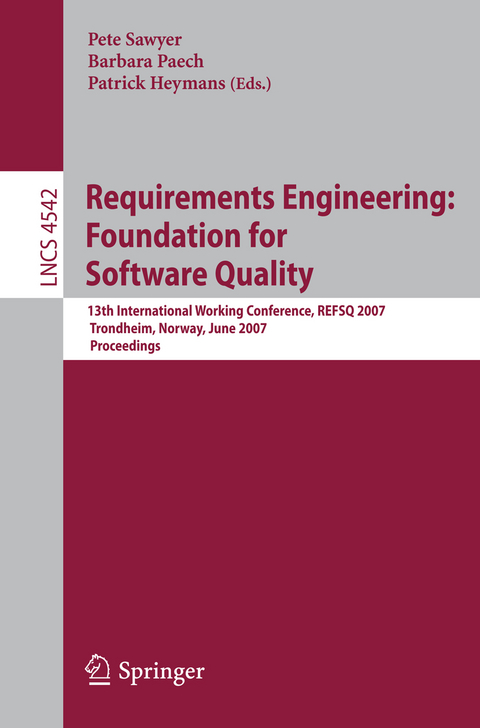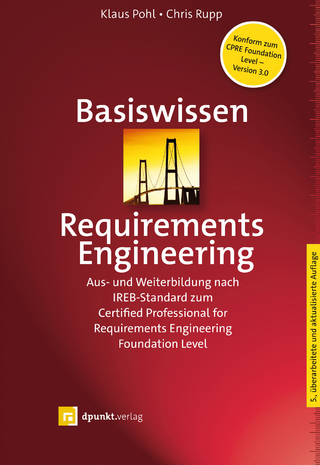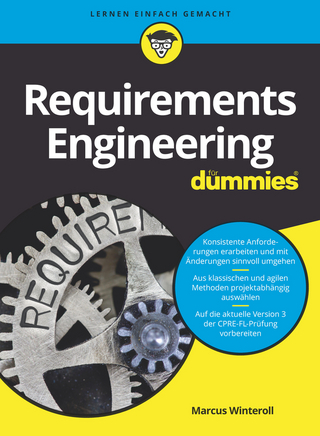
Requirements Engineering: Foundation for Software Quality
Springer Berlin (Verlag)
978-3-540-73030-9 (ISBN)
REFSQ 2007 International Working Conference on Requirements Engineering: Foundation for Software Quality.- Comparing Goal Modelling Languages: An Experiment.- Automatically Generating Requirements from i* Models: Experiences with a Complex Airport Operations System.- Structuring the Co-design of Requirements and Architecture.- A Template for Requirement Elicitation of Dependable Product Lines.- A Flexible Requirements Analysis Approach for Software Product Lines.- Integrated Requirement Selection and Scheduling for the Release Planning of a Software Product.- A Value-Based Approach in Requirements Engineering: Explaining Some of the Fundamental Concepts.- Value-Based Requirements Engineering for Value Webs.- A Quantitative Assessment of Requirements Engineering Publications - 1963-2006.- Handshaking Between Software Projects and Stakeholders Using Implementation Proposals.- Generating Fast Feedback in Requirements Elicitation.- Informing the Specification of a Large-Scale Socio-technical System with Models of Human Activity.- Integration Use Cases - An Applied UML Technique for Modeling Functional Requirements in Service Oriented Architecture.- Optimal-Constraint Lexicons for Requirements Specifications.- Integrating All Stages of Information Systems Development by Means of Natural Language Processing.- Information Flow Between Requirement Artifacts. Results of an Empirical Study.- Imperfect Requirements in Software Development.- Towards a Tomographic Framework for Structured Observation of Communicative Behaviour in Hospital Wards.- A Quality Performance Model for Cost-Benefit Analysis of Non-functional Requirements Applied to the Mobile Handset Domain.- Security Requirements for Civil Aviation with UML and Goal Orientation.- Challenges for RequirementsEngineering and Management in Software Product Line Development.- ElicitO: A Quality Ontology-Guided NFR Elicitation Tool.- Exploring the Characteristics of NFR Methods - A Dialogue About Two Approaches.- Defining Reference Models for Modelling Qualities: How Requirements Engineering Techniques Can Help.- Integrating an Improvement Model of Handling Capacity Requirements with the OpenUP/Basic Process.- Mal-Activity Diagrams for Capturing Attacks on Business Processes.- Towards Feature-Oriented Specification and Development with Event-B.
| Erscheint lt. Verlag | 31.5.2007 |
|---|---|
| Reihe/Serie | Lecture Notes in Computer Science | Programming and Software Engineering |
| Zusatzinfo | IX, 386 p. |
| Verlagsort | Berlin |
| Sprache | englisch |
| Maße | 155 x 235 mm |
| Gewicht | 599 g |
| Themenwelt | Informatik ► Software Entwicklung ► Requirements Engineering |
| Schlagworte | Business Process • conceptual modeling • Design Optimization • formal methods • formal specification • Hardcover, Softcover / Informatik, EDV/Informatik • HC/Informatik, EDV/Informatik • Model Checking • model driven SE • model transformation • non-functional requirements • Planning • Processing • QoS • quality modeling • quality requirements • Reference Models • Requirements Engineering • requirements management • security • security requirements • Service Oriented Architecture (SOA) • service-oriented computing • Software Architectures • Software engineering • Software Product Lines • Software Reuse • Software Testing • UML • unified modeling language (UML) • verification • Web Services |
| ISBN-10 | 3-540-73030-3 / 3540730303 |
| ISBN-13 | 978-3-540-73030-9 / 9783540730309 |
| Zustand | Neuware |
| Haben Sie eine Frage zum Produkt? |
aus dem Bereich


